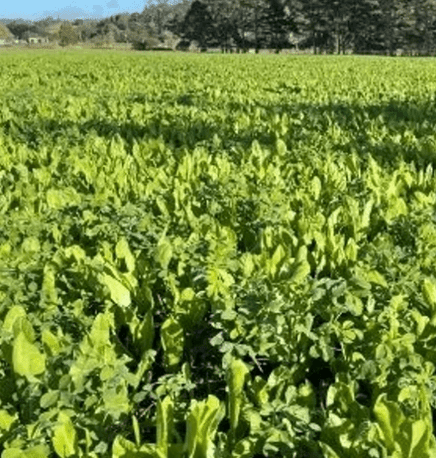Sulphur
Sulphur is important for protein synthesis being a component of two essential amino acids, cysteine and methionine. It is required for the formation of vitamins and chlorophyll, as well as the development of legume nodules. It is a component of certain oil compounds creating a distinctive odour and flavour to plants such as onions, garlic and brassicas.
Sulphur aids in the translocation of sugars and starches to the roots. Early morning brix levels may be high when sulphur is low. It activates nitrate reductase, so is essential for the conversion of nitrate to amino acids. When sulphate is deficient nitrate accumulates and protein levels decrease. Disease pressure will increase. Sulphur is required in amounts similar to phosphorus.
Deficiency symptoms are very similar to nitrogen deficiency symptoms
Deficiency symptoms are very similar to nitrogen deficiency symptoms i.e. pale green leaves, but usually on young leaves, although can be on older leaves in some plants such as tobacco and cotton. Symptoms include small and spindly plants; delayed maturity; reduced nodulation in legumes and fruits that do not fully mature. Other symptoms are dependent on species e.g. spotting on potato leaves.
In the soil, sulphur occurs as a negative charge sulphate ion: not attracted to soil clay, therefore easily leachable.
Monitor soil levels regularly, particularly sandy soils; good organic matter levels will hold onto sulphur.
Sulphur is good for leaching excess cations
Sulphur is good for leaching excess cations. E.g. 2kg of sulphur will reduce 1kg of calcium, potassium or sodium if they are in excess. If excesses of calcium, magnesium, potassium or sodium exist, sulphur levels will not build in the soil. Sulphur may leach calcium or other cations when they are not in excess in coarse, open volcanic soils, particularly those found on the central plateau.
The main form taken up by plants is sulphate (SO4). Crops also have the ability to take up sulphur through their stomata in the form of gaseous sulphur dioxide, SO2.
In animals sulphur is a component of protein. It is important for collagen synthesis, being present in large amounts in hair, skin and hooves. Sulphur is also involved with the B vitamins biotin and thiamine, and the hormone insulin. Sulphur must be present for stock to receive essential amino acids.


